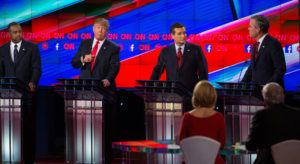Bringing U.S. Presidential Debates to a Chinese Audience

Republican presidential candidates debating in Las Vegas on Dec. 15. A network of volunteer translators in China called the Guojiang Subtitle Group has been posting videos of the debates online with Chinese subtitles. Credit Ruth Fremson/The New York Times
BEIJING — From his graduate student dormitory in the southern city of Guangzhou, Yin Hao works late into the night with an online network of about half a dozen other volunteer translators. Their task: to post the American presidential debates, with Chinese subtitles.
“Watching the U.S. presidential debates is like watching a football match,” said Mr. Yin, 29. “You see a lot of moves and tactics by the candidates, but eventually it all comes down to who scores.”
Mr. Yin, a confessed politics junkie, is a member of the Guojiang Subtitle Group, which brings together about 70 volunteers from across the country who produce Chinese subtitles for primarily American television shows. (He asked that his university not be identified, to avoid associating it with the project.) His decision to translate the debates was motivated by personal interest, he said, but it was also a response to Chinese people’s desire to watch what he described as a “frenzy.”

Zhou Qianyu, a Beijing high school student, started the Guojiang Subtitle Group in 2014. Credit Courtesy of Zhou Qianyu
Once the translations are completed, the videos are uploaded to the group’s Weibo account and onto Chinese video-sharing websites like Sina Video. Its subtitled video of the first Republican debate, on Aug. 6, generated millions of views in the days after its release, said Zhou Qianyu, 18, a high school student in Beijing who started the group in 2014.
So far, Chinese officials have largely refrained from commenting publicly on the debates, but the face-offs among the American candidates have made some waves online. Some Chinese users have poked fun at the encounters, saying that they are little more than entertainment.
“Very sophisticated and wonderful fight,” said a Weibo user with the name I am afraid of roller coasters. “It’s as fascinating as watching a reality show.”
A person with the handle Whea_O wrote, “This is way better than an American TV series.”
Others have voiced dismay at the level of discussion.
“There isn’t that much discussion of policy issues,” said Zhang Xueqi, 26, a former business consultant in Beijing, after watching a video of the Dec. 15 Republican debate. “Many remarks are just sensational.”
Donald J. Trump, who leads most polls among the Republican candidates, and Hillary Clinton, who leads among the Democrats, appear to be attracting the most comment.
A user called Dr. Jiaxiaojia praised Mrs. Clinton’s self-confidence and noted that she had support from a Democratic rival on the issue of her email, while relations in the Republican camp sometimes resembled a “civil war.”
Another commenter wrote: “I will watch these women in 2016: Hillary Clinton, Aung San Suu Kyi and Tsai Ing-wen,” referring to the Myanmar democracy leader and a candidate for the presidency of Taiwan.
“I really dig old Trump, whose head has a gigantic hole and who won’t stop his sensational remarks,” the user I am afraid of roller coasters wrote. “I suspect Hillary will become president.”
Mr. Yin said that the Republican debates appeared to be getting more attention in China thanks largely to Mr. Trump, whose often unbridled remarks have earned him the nickname “big mouth” in China. He is also known as “broken bed,” a homonym for part of his name in Chinese: “Chuangpo.”
Mr. Trump’s misstatements about China have prompted occasional mockery. During the Republican debate on Nov. 10, he called the Trans-Pacific Partnership trade agreement a disaster and China the “No. 1 abuser” of the United States.
“The T.P.P. is a horrible deal,” Mr. Trump said, adding, “It’s a deal that was designed for China to come in, as they always do, through the back door and totally take advantage of everyone.”
One problem: China is not part of the Trans-Pacific Partnership, as Mr. Trump’s Republican rival, Senator Rand Paul of Kentucky, pointed out during the debate.
The user running bunny 007 asked of Mr. Trump on Weibo: “Are you joking on purpose? How could you not know? How can you be the big boss?” The comment concluded with an emoji of a sweating face.
Mr. Trump is not the only candidate to have criticized China. At the same debate on Nov. 10, Gov. Chris Christie of New Jersey accused China of online warfare against the United States and promised that his administration would retaliate with “cyberwarfare like they have never seen before” and release embarrassing information about the Chinese leadership. “We will make sure all the Chinese people see it,” Mr. Christie said.
Another candidate, the former chief of Hewlett-Packard, Carly Fiorina, has argued that the United States should work with its allies to contain China, which she called a “rising adversary.”
Many Chinese view such comments from their country’s critics with a shrug. Hu Di, 33, who works in marketing at a solar power company in Beijing, said: “They have always treated China as a competitor, and their policy now is to contain China. They want to prevent China from overtaking their No. 1 spot.”
A recent Pew Research Center survey found that 54 percent of Chinese respondents believed the United States was seeking to limit China’s rise, while 67 percent said China would replace or had already replaced the United States as a superpower.
But sometimes the candidates’ remarks go too far for the translators at the Guojiang Subtitle Group.
“When translating certain strong statements, we’ll pay close attention, and if certain words are too strong, we’ll tone them down,” Ms. Zhou said.
At least once, the translators decided to go a step further
During the Dec. 15 Republican debate, Mr. Paul attacked the suggestion by Mr. Trump that the United States should block parts of the Internet to prevent the Islamic State from attracting recruits. Mr. Paul said: “Trump says we ought to close that Internet thing. The question really is, what does he mean by that? Like they do in North Korea? Like they do in China?”
The Chinese subtitles replaced “China” with “other countries.”